British Warplane Shoots Down Drone Near US Base In Syria

A British warplane in a US-led coalition shot down a drone this week near a base where US troops are stationed in southern Syria, officials said on Thursday.

A British warplane in a US-led coalition shot down a drone this week near a base where US troops are stationed in southern Syria, officials said on Thursday.
The base, known as Tanf, is in a strategic area near Syria's border crossing with Iraq and Jordan and houses a small number of US troops.
Britain's defense ministry said a Typhoon warplane shot down a "small hostile drone" that was a threat to coalition forces. It said this was the first air-to-air engagement for a Royal Air Force Typhoon.
US Central Command spokesman, Navy Captain Bill Urban, said two drones entered the Tanf garrison "deconfliction" zone on Tuesday and one was shot down as it moved closer to the base. He said there were no casualties or damage to facilities.
It was not immediately clear who owned the drone.
Iranian-backed forces have in the past attacked US troops with drones and rockets in eastern Syria and Iraq. In October, a number of drones were used against the base, although there were no casualties.
US officials have said Iranian-backed militia could increase attacks on US troops in Iraq and Syria in coming weeks, in part to mark the anniversary of the killing of top Iranian general Qasem Soleimani and Iraqi militia commander Abu Mahdi al-Muhandis killed by a US drone strike in Iraq on Jan. 2, 2020.
Report by Reuters
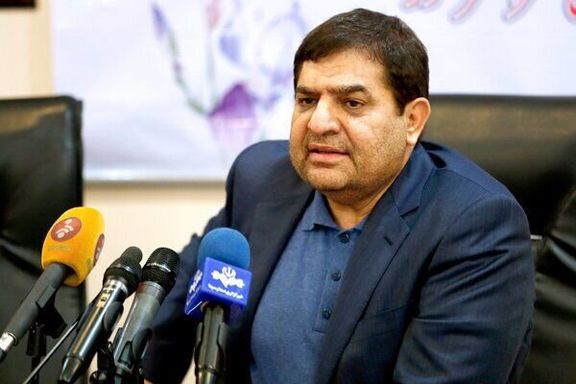
Iran’s vice president Mohammad Mokhber has revealed that COVID vaccine production equipment was brought into the country using an ambassador’s diplomatic pouch.
President Ebrahim Raisi’s first vice president speaking at a meeting of Iranian envoys in neighboring countries said, “In a money transfer attempt to a foreign country a trace of an operation related to vaccines was discovered and we imported the equipment as the household goods of our ambassador.”
He quickly remarked that he should not have said that, but added that “We have solutions to any problems in the country.”
Before becoming vice president Mokhber headed an effort to develop and produce a homegrown vaccine, after Supreme Leader Ali Khamenei banned the purchase of American and British vaccines in January.
Mokhber who repeatedly promised to produce 50 million doses by August has reportedly delivered only nine million doses to the health ministry. Reports and criticism in local media have spoken of hundreds of million of dollars of state funds given to local vaccine producers who failed to come up with enough doses to inoculate people until August.
A wave of new infections that hit Iran in June killed around 40,000 people until foreign vaccines were finally imported in sufficient quantities in August and September.
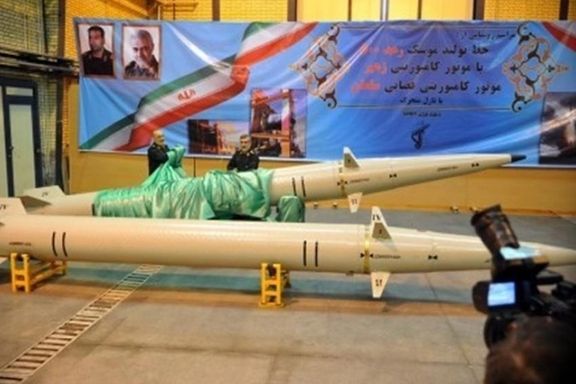
The US Department of Commerce Thursday designated several Chinese and other companies that have aided Iran’s conventional weapons’ development to Entity List for acting against US interests.
A statement issued by the Department said the End-User Review Committee (ERC), composed of representatives of the Departments of Commerce (Chair), State, Defense, Energy and, the Treasury makes determination if a company has inappropriately diverted US technology for purposes that are harmful to US interests.
A senior administration official had said earlier in the day the Commerce Department and Treasury Departments would announce a series of actions on Thursday targeting Chinese companies that Washington says use biotechnology and surveillance to abuse human rights.
Aside from China, the Commerce Department also took action against entities from Georgia, Malaysia, and Turkey for allegedly "diverting or attempting to divert U.S. items to Iran’s military programs."
A document released said several companies are being designated “for actions contrary to the national security or foreign policy interests of the United States. Specifically, these companies have supplied or attempted to supply U.S.-origin items that could provide material support to Iran’s advanced conventional weapons and missile programs...”
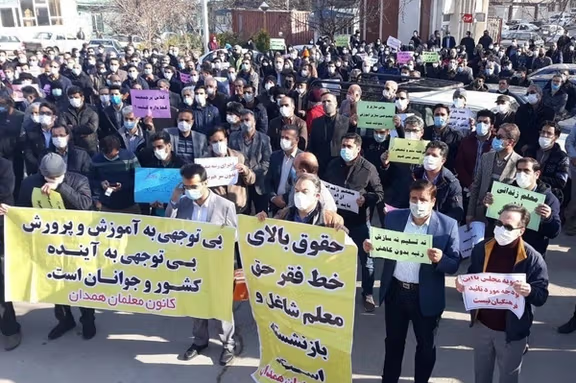
Rejecting a bill passed Wednesday offering some pay increases, teachers in Iran vow to continue protests if by Sunday parliament does not amend its legislation.
Teachers have been holding protests and demanding the implementation of a previous legislation, which would bring salaries and pensions in line with of other civil servants, and would benefit around 750,000 educators.
Parliament voted to appropriate a little over one trillion rials a month to finance new pay scales for teachers, but Mohammad Habibi, spokesperson of the teacher’s union said after the vote that “What was approved today in parliament was an improvisation,” not the enactment of a real pay scale.
The money approved by parliament would be added to salaries immediately, but calculated in US dollars, on average each teacher will receive just $11 dollars a month in extra pay, which would not help much in dealing with the current annual inflation rate of 45 percent. The poverty line in Iran is now around $400 a month income for a family of 3.3 people, and most teachers are getting much less than that. Even with the extra pay, around 80 percent would earn less than the minimum salary needed.
Food prices have risen by more than 60 percent this year, on top of high inflation in the previous three years. Government figures released in recent days showed that prices for 83 percent of basic food staples have reached a critical level. People living on salaries have cut back on consumption of nutritious food, such as meat, fruits and dairy products.
What seems to have prompted parliament to act quickly was a nationwide protest of tens of thousands of teachers on Monday [Dec. 13]. With rising pieces and growing poverty, the government is sensitive to new protests, concerned that any economic grievance can trigger general nationwide unrest, similar to bloody protests in November 2019, when security forces killed hundreds of unarmed people.
Tehran is also engaged in nuclear talks with world powers in Vienna and any large protests might weaken its position in the negotiations, that from Iran’s perspective is aimed at removing US economic sanctions that have battered its economy since 2018, when former president Donald Trump withdrew from the Obama-era nuclear agreement known as JCPOA.
On Thursday, hundreds of teachers demonstrated in the western city of Hamedan, rejecting parliament’s decision. They also demand the release of union activists arrested over the years and charged with a variety of security offenses. They are practically political prisoners, like many journalists and civil society activists, who do not receive a fair trial and are accused of trying to overthrow the regime.
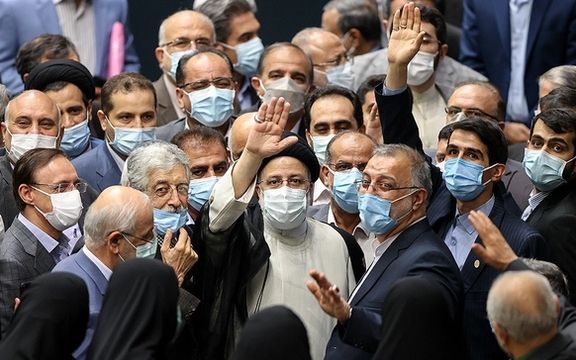
Some of Iran's conservatives are said to be thinking of distancing themselves from President Ebrahim Raisi to guarantee their electability in future elections.
Iran's conservatives who call themselves "Principlists" formed a coalition with Raisi in June and helped him win the presidential election. At least three rival conservative candidates have now major posts in the government: Vice President Mohsen Rezaei, martyrs Foundation Chief Amir Hossein Ghazizadeh Hashemi and Mayor of Tehran Alireza Zakani. Nonetheless, Raisi insists that he was an independent candidate.
Now, most of the criticism by conservatives who are not part of the administration is about Raisi's ministerial cabinet choices. Many, particularly those in the parliament have lashed out at Raisi for nepotism and giving key jobs to well-connected individuals with little or no qualifications.
Other conservatives argue that six months is not long enough time for passing judgement on Raisi and his ministers' performance. However, eye-catching shortcomings in his performance and his failure to carry out some of his promises, have prompted many conservatives to believe that their support for Raisi may damage their reputation.
Raisi’s worst intractable problem is controlling runaway inflation that is impoverishing millions of working-class citizens. He made lofty promises during his campaign, but independent observers knew that without an agreement with the United States and lifting of sanctions, Iran had no chance to resolve its economic crisis even partially.
Rasoul Salimi a journalist at Khabar Online, a moderate conservative website has observed, that Raisi’s weak performance has left Iran's conservatives with three choices - "unconditionally supporting" Raisi, lending some kind of "critical support" to the president, or changing their position from supporters of Raisi and his team to their "critics."
According to Salimi, making this choice is particularly important because once Raisi's failure is established and dissatisfaction over his administration's performance becomes widespread, it will be extremely difficult for conservatives to deny their support for the winner of the June election. They supported Raisi because they thought he can solve the country's economic problems having a conservative parliament, judiciary and military behind him.
It was a coalition of four political forces including the right-wing Society of Combatant Clerics, the young conservatives who had won the 2020 parliamentary elections, the former supporters of populist President Mahmoud Ahmadinejad and the entire fleet of conservative media in Iran risked their credibility when they joined hands to send Raisi to the Presidential Office.
All of these groups have already risked their voter base and have occasionally come under attack by their young supporters who think they have been misled to support a president and an administration that are not competent enough and at times have caused embarrassment.
The frustration by young conservatives became apparent during a ceremony at a university earlier this month, when a leader of an Islamist student group harshly criticized Raisi in his presence, saying he is not a freely-elected president.
“We are speaking to you not as a president elected with the free vote of the people in a free election. We are speaking to you as a representative of the ruling system,” the student lamented.
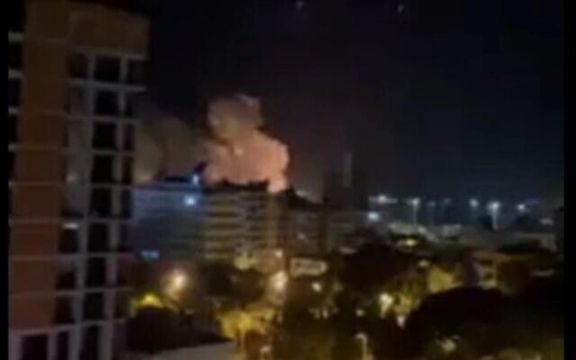
Israel fired missiles at targets in southern Syria early Thursday near its frontier where it is concerned about deployments of Iran-backed forces, Syria said.
Syrian government media announced a soldier was killed but an Israeli military spokesperson declined to comment to Reuters on the report.
Israel has mounted frequent attacks since 2017 against what it has described as Iranian targets in Syria, where Tehran-backed forces including Lebanon's Hezbollah have deployed over the last decade to support President Bashar al-Assad in Syria's war.
Citing a military source, Syrian state news agency SANA said, "the Israeli enemy carried out an aerial aggression", firing missiles from the Golan Heights, territory Israel captured from Syria in 1967.
An air attack attributed to Israel took place on December 7against the Syrian port of Latakia, a stronghold of President Bashar al-Assad’s regime. Warehouses and shipping containers thought to be Iranian shipment of weapons were hit.
While Israel has carried out many attacks throughout Syria, the air raid on Latakia was a rare occurrence, said to be designed to send a strong signal to Tehran amid Israeli threats to target Iran’s nuclear infrastructure is it feels a strategic threat.